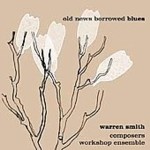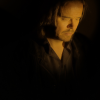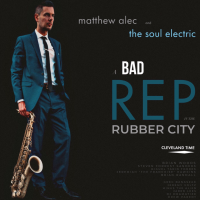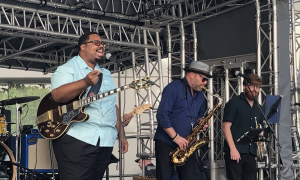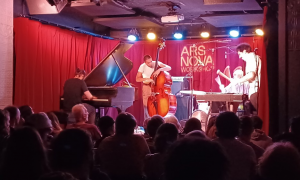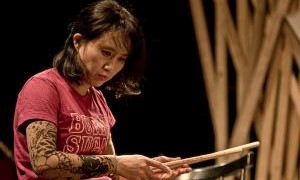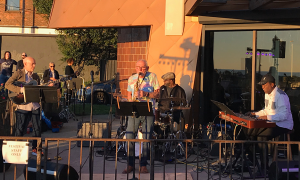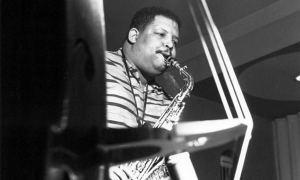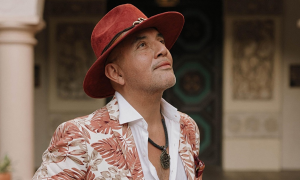Home » Jazz Articles » Live Review » Montreal Jazz Festival: Days 4-6, July 4-6, 2009
Montreal Jazz Festival: Days 4-6, July 4-6, 2009
Joshua Redman By Invitation Day 1 / Brian Blade and the Fellowship Band
Joshua Redman By Invitation Day 2 / Kenny Werner Quintet
Jeff Beck / Anat Cohen
Festival International de Jazz de Montreal
Montreal, Quebec, Canada
July 4-6 2009
With the new Maison du Festival housing the press room, performance spaces and more, the closing of Montreal's legendary Le Spectrum club a couple years back is quickly becoming a distant memory. There's a lot of construction and renovation going on in Montreal to increase the availability of performance spaces, including a new 2,000 seat venue being built in Place des Arts as a permanent home for the Montreal Symphony, leaving the larger Wilfred Peltier hall available and wired for non-classical performances. And as the terrace behind the Maison du Festival nears completion, the downtown core of Montreal is turning into a cultural mecca few cities can match.

That a festival can close off six square blocks in the core of a busy urban center is remarkable. That it can do so and create a party atmosphere that's like being on another planet is even more incredulous. But visiting FIJM is truly like being transported to another place where it's easy to lose track of the days and what's going on in the outside world, and instead become immersed in nothing but music.
The 30th anniversary continues with saxophonist Joshua Redman taking over the By Invitation series for three evenings, each with a different and stellar line-up. It's impossible to catch anywhere close to all the free and ticketed shows, and so the only way to handle the festival is to make choices and, for the rest of the shows, live vicariously through the experiences of others. With a roster of shows including Brian Blade and the Fellowship Band, Kenny Werner Quartet, Jeff Beck, Anat Cohen and more, there's plenty of great music to be found each evening—and that doesn't include checking out the free shows at the numerous stages around the festival grounds.
The festival also continues to reach into the music industry with both the general Salons des Instruments de Musique de Montreal (SIMM) and the more specific Salon de Guitare de Montreal trade shows—the latter a three-day mini-festival that features free workshops and performances by a broad range of six-stringers. It's difficult to imagine how much further FIJM can expand, yet each year there's something new to broaden the appeal of the festival to include fans of all ages, as well as professional and aspiring musicians.
Chapter Index
- July 4: Joshua Redman/Aaron Parks/Matt Penman/Eric Harland
- July 4: Brian Blade and the Fellowship Band
- July 5: Joshua Redman/Joe Lovano/Sam Yahel/Reuben Rogers/Gregory Hutchinson
- July 5: Kenny Werner Quintet
- July 6: Jeff Beck
- July 6: Anat Cohen
July 4: Joshua Redman/Aaron Parks/Matt Penman/Eric Harland
With saxophonist Joshua Redman taking over the intimate Gesú Centre de Créativité for two days (his third show will be at the larger Place des Arts), other than knowing the personnel there was little to indicate what the shows would be about. Redman's last couple of albums have focused largely on saxophone trios—Way Out East (Nonesuch, 2007) featuring three different trios with a handful of special guests, and Compass (Nonesuch, 2008) a more ambitious project with, on most tracks, a double rhythm section of two bassist and two drummers.
Neither release could prepare the capacity crowd for Redman's opening night. With pianist Aaron Parks, whose own trio performance the previous night was an early festival highlight; bassist Matt Penman, last seen in Ottawa with the SFJazz Collective in March of this year; and drummer Eric Harland, already seen earlier in the week with the Monterey 4, the quartet's Montreal show was its first, and if its 80-minute set was any indication of how this group is going to sound with a few more dates under its collective belt, then this may well be one of the most exciting new acoustic jazz groups to emerge in recent years.

l:r: Aaron Parks, Joshua Redman, Matt Penman, Eric Harland
Redman may have arrived on the international scene a little early but, in recent years, he has been delivering on the promise of a beginning that was, perhaps, overly hyped as the next big thing before he was truly ready to assume any kind of mantle. With a set of largely original material by himself, Penman and, in particular, Parks—most of it segueing together to create a series of long, suite-like performances—there was more than enough solo space for everyone and a never-ending sense of excitement that made it one of the festival's hottest shows. Redman also played with an uncharacteristically fierce and visceral power on both tenor and soprano, encouraging screams of approval and applause by the audience from the get-go. Three suites that stretched out over 70 minutes, with little pause in-between and with absolutely no introductions from the saxophonist, wound their way through a variety of feels, tempos and dynamics; a thoroughly modernistic set that was imbued with classical elements, unfettered free expression and a plethora of rhythmic contexts that ranged from delicate and impressionistic to raw, backbeat-driven grooves.
Recruiting a trio that already has considerable chemistry makes for a quick transition into a group that sounds as though it's been playing for years. Parks, Penman and Harland played together on the pianist's debut as a leader, Invisible Cinema (Blue Note, 2008), and a number of pieces from that album provided some of the performance's best moments, including a barnstorming version of the episodic "Harvesting Dance" that featured a solo from Harland, over a relentless ostinato, that literally brought the house down.
And yet, even when the material's often detailed thematic constructs opened up into more open-ended improvisational features for everyone in the group, there was a remarkable focus that avoided excess and, instead, gave the entire performance the feeling of a directed form of free play. Penman, who took a number of outstanding solos, remained the group's focal point, at times barely containing the unbridled energy coming from the rest of his bandmates, but always managing to hold things together. Redman proved an egalitarian leader, leaving considerable space for Parks in particular. Still in his mid-twenties, Parks can only be compared to a young Keith Jarrett in his ability to pull an endless flow of remarkable ideas out of the ether, improvising with the kind of élan that suggests if he's not already considered a giant (and by all rights he should be), he's clearly one of the emerging icons that the recent television documentary series Icons Among Us: Jazz in the Present Tense was referring to.

But if a single star had to be chosen from the four—a challenge in itself—it would have to be Harland. Shuffling between so many different gigs (in addition to working with the Monterey 4 he'll be in Ottawa with Charles Lloyd the following evening) in the space of only a few days with almost uncanny aplomb, his playing was incendiary. His final solo on "Harvesting Dance" was not just a marvel of invention; it was a wonder of texture, polyrhythm and pulse. Calling what he does beneath other soloists accompaniment is a disservice, as his role is nothing short of equal, whether he's providing a fervent backbeat, creating a staggeringly rapid rhythm by using two sticks in one hand, over and under the high hat, or responding to everything going on around him with the kind of empathic spontaneity that's truly rare. As he grows seemingly exponentially, he's clearly another artist headed for iconic territory.
When the set ended, and it seemed to go by in a flash, Redman and his quartet received the strongest applause and ovation of any act seen yet this year. Returning to the stage with Parks' very Jarrett-like, gospel-tinged "Roadside Distraction" was an astute choice to feed the audience the encore it demanded, while at the same time slowly turning the heat down to allow the group an easier chance of exiting the hall.
Far too many touring projects don't end up being recorded, but if this project isn't documented, then it'll be more than a shame, it'll be a crime. The heat and excitement of Redman's first show certainly raised the bar—and expectations—for the second one, coming the following evening with saxophonist Joe Lovano, bassist Reuben Rogers, drummer Gregory Hutchinson and pianist Sam Yahel.
July 4: Brian Blade and the Fellowship Band
Over the years drummer Brian Blade's Fellowship Band has been gradually diminishing in size. Starting as a texturally distinct septet that featured two reeds, keys, guitar, pedal steel, bass and drums, in recent years and on Season of Changes (Verve, 2008), the group became a sextet when pedal steel guitarist Dave Easley, who made Perceptual (Blue Note, 2000) such a groundbreaking record, left the band. Carrying on as a sextet with longtime members Kurt Rosenwinkel (guitar), Jon Cowherd (keyboards), Myron Walden (alto saxophone, bass clarinet), Melvin Butler (tenor saxophone) and Chris Thomas (bass), the group's voice was retained by both the combination of players and Blade's unique writing, which found its own way to blend the instruments—especially the horns—into a sound where the whole was truly greater than the sum of its parts.

While there was plenty to recommend about the group's late night performance at Gesú, this even further slimmed down Fellowship Band—now a quintet with Blade, Cowherd, Walden, Butler and Thomas—still retained its identity, but equally has lost something. The guitar—and especially the combination of guitar and pedal steel—always gave the group a distinct complexion, especially since it's relatively rare to see a horn-led group with both piano and guitar (let alone piano, guitar and steel guitar), and Rosenwinkel, in particular, added a slightly countrified but sophisticated style and ethereal tone that helped give Fellowship its sound.
Still, any opportunity to watch Blade is one worth grabbing, and when he's with his own group, performing his own material, he seems to become even more energized than usual. At the performance he was like a dervish at times, a physical player whose arms seemed to flail and whose body would lift out of the drum chair as he leaned forward to hit the kit with a paradoxical combination of power and grace. Seeing two of the most remarkable young drummers in jazz in one evening—Blade and Harland—only demonstrated the differences between the two. Harland is a crisp and definitive player, while Blade's tone is warm and woody, his cymbals dark-hued. Harland seemingly constructs his solos with great care; Blade enters a zone and plays in an almost stream-of-consciousness fashion, despite remaining completely focused. Both drummers are an education to watch; all the more so for their vastly different approaches.
The quintet wound its way through a set that mixed new material with some culled from Season of Changes, including the opening "Stoner Hill"—a brief, lyrical and folkloric tune that, as gentle as it was, established a very different vibe for a set that gradually turned up the heat to feature strong solos from everyone. Walden was particularly impressive, especially on the haunting "Improvisation," from Season of Changes—a bass clarinet duet with Cowherd on pump organ—and later, when a lengthy alto solo gradually, inexorably built to an almost orgiastic climax that not only had Blade yelling in admiration, but the audience as well. The ensemble work, especially the way in which Walden and Butler orbited, weaved and came together in unison on Blade and Cowherd's charts, was definitive of the Fellowship sound, but while Cowherd did much to capably fill the gap left by Rosenwinkel's absence, that absence was felt nevertheless.

l:r: Jon Cowherd, Myron Walden, Melvin Butler, Chris Thomas
The sold out crowd at Gesú was clearly primed for Blade and the Fellowship Band before it hit the stage, and once it did, all expectations were met for a performance that was almost as cathartic as Joshua Redman's, in the same venue a few hours earlier. But for Fellowship to continue with the sound that has defined it since the beginning, it truly needs to go back to at least a sextet with Rosenwinkel (or any of a number of other guitarists who might fit the bill, although Rosenwinkel has proven himself the right one for the band). As powerful as its performance was, it does run the risk of losing the very qualities that give it a unique and immediately recognizable voice.
July 5: Joshua Redman/Joe Lovano/Sam Yahel/Reuben Rogers/Gregory Hutchinson
For his second By Invitation series performance, saxophonist Joshua Redman took a right turn from the modernistic bent of his show the previous evening to the modern mainstream. Featuring longtime musical partner/pianist Sam Yahel, saxophonist Joe Lovano, bassist Reuben Rogers and drummer Gregory Hutchinson, it was an updated version of twin tenor workouts of the past including Gene Ammons/Sonny Stitt, Sonny Rollins/John Coltrane, Dexter Gordon/Ammons and, more recently, Chris Potter/Lovano. With material culled largely from two previous collaborations between the saxophonists—Lovano's Tenor Legacy (Blue Note, 1994) and Redman's Back East (Nonesuch, 2007)—it was a cooking 80-minute set that may not have been as hot as the evening before, but simmered throughout and, occasionally, boiled over.

l:r: Sam Yahel, Joshua Redman, Joe Lovano, Reuben Rogers, Gregory Hutchinson
Starting with Booker Little's amiably swinging "Rounder's Mood" and followed by Lovano's slightly edgier tribute to the late drummer Ed Blackwell, "Blackwell's Message," the set's premise was made clear from the get-go: solos from the rhythm section were plentiful, but the emphasis was on Redman and Lovano. In his first spoken introduction, Redman talked about how great it was to have Lovano there to kick his ass, and how much he enjoyed doing the By Invitation series, but that it was a lot of work, considering how he normally works for long periods on one project, and here he had to put two together back-to-back. Still, while there was no mistaking the care that went into selecting the personnel and material, the feel of the performance was one of effortless mastery, with Lovano and Redman at times orbiting around each other and coming together in powerful unison, at other times trading solos that, with the energetic backing of Yahel, Rogers and, in particular, Hutchinson, made for an exciting set.
Mainstream it may largely have been but it also ventured into freer territory on a visceral look at Ornette Coleman's "Kathelin Gray," and turned more cerebral/abstract on a particularly strong version of Wayne Shorter's "Indian Song." Lennie Tristano's aptly titled "Wow," with its high speed head, powerful pulse and some of the show's strongest solos—not just from Redman and Lovano, but from Yahel as well—was one of the set's highlights, as was the Gene Ammons/Sonny Stitt workout, "Blues Up and Down," where Redman and Lovano tore it up for the set's longest track, resulting in an immediate standing ovation and no chance to leave the full house without at least one more tune. Yahel is all-too-often associated with more electric projects and for his fine Hammond organ work, but he's an equally imaginative pianist, based on his solos here and his all-acoustic, all-piano disc, Hometown (Posi-Tone, 2009).
Redman and Lovano commanded the set with an ability to push each other to greater heights, switching to soprano saxophones for the modal "Mantra #5," but Hutchinson came a close second; a powerful drummer who may not have the cachet of Harland or Blade but joined them, on the strength of this performance, in making the 30th edition of FIJM one of the strongest in terms of participating drummers.
July 5: Kenny Werner Quintet
Pianist Kenny Werner's return to Montreal, with a crack line-up featuring saxophonist David Sanchez, trumpeter Randy Brecker, bassist Scott Colley and drummer Antonio Sanchez, was another performance that, while focusing heavily on the leader's unfettered improvisational skills, was also notable for another powerhouse drummer who lit a fire under his band mates while, at the same time, delivering the kind of subtlety some of the music—largely culled from Werner's eclectic Lawn Chair Society (Blue Note, 2007)—demanded. Antonio Sanchez has been on tour recently with Gary Burton, delivering another commanding performance recently at the 2009 Ottawa Jazz Festival, but with Werner the context is freer, less stringent, and he not only provided flexible and telepathic support in concert with Colley, but one of the festival's most perfectly constructed drum solos yet, on the closing "Hedwig's Theme," from the Harry Potter movies series.

Lawn Chair Society found Werner augmenting his piano with keyboards and computer, but his Montreal performance was entirely acoustic and demonstrated that the best material is grist for interpretation, regardless of the context. Opening with the funky "Lawn Chairs (And Other Foreign Policy)," the approach was looser, more open-ended than that on the album, if for no other reason that it was used as a jumping board for solos, with its funky theme acting as a rallying motif to signal that it was time to switch soloists who traveled considerable distance from its core form. David Sanchez, staying exclusively with tenor saxophone, delivered solos that were not surprising for any who'd seen him in Ottawa in 2005 and saw his capacity for transcending his Latin roots into more modernistic territory. Here, his solo features were long-form excursions into areas of free expression that still retained a defined focus and near-compositional concern.
Brecker possesses one of the most distinctive trumpet voices in contemporary jazz, whether he's exploring the music and musicians of Brazil on Randy in Brasil (MAMA, 2008) or delving into big band-driven, uptown funk territory with his brother, the late saxophonist Michael Brecker, on Some Skunk Funk (Telarc, 2006). Here, his appealing tone and prodigious technique made for some of the set's most flat-out exciting solos, traversing the range of his instrument without ever sounding anything less than completely relevant on both "Hedwig's Theme" and "Lawn Chairs."
With Brecker and David Sanchez spending considerable time offstage, it was a pleasure to see Colley featured so heavily, the bassist delivering an elastic yet lyrical solo on Werner's poignant ballad, "Uncovered Heart," written for the birth of his daughter. Colley has long been a ubiquitous player known for being a creative but unshakable anchor, but it's rare that he receives this much solo space; he was, in fact, the most featured voice, next to Werner's.
Werner was, as ever, relaxed and clearly enjoying himself as he created unaccompanied solos of Jarrett-like invention. Werner's Effortless Mastery (Jamey Aebersold, 1996) is the bible for learning how to improvise in ways that eschew falling back on preconceived patterns, and it's clear that while he's a highly regarded teacher on that subject, he's managed to avoid the old adage "those that can't do, teach." Clearly he can do, his opening to "Uncovered Heart" combining a spare left hand motif with rare gentility of the right to create something not unlike the music of ambient forefather Harold Budd's overt classicism, but with greater flexibility and more sophisticated language. When the group came in for the song's optimistic theme, it was almost anti-climactic, so hauntingly beautiful and tranquil was Werner's extended and unaccompanied introduction.

l:r: Kenny Werner, David Sanchez, Scott Colley, Randy Brecker, Antonio Sanchez
Werner has been far too under-recorded in recent years—at least in North America, with albums coming out regularly elsewhere. The fact that he's relying on material from an album that's over two years old, (as outstanding as that album is, and as significant as this all-acoustic performance of often plugged-in music was), only highlights the fact that he should be getting attention from labels like Blue Note to record on a more frequent basis. In the meantime, this performance will rank as one of FIJM 2009's sleeper hits—under-attended with a roughly two-thirds full house at Place des Arts' Théâtre Jean-Duceppe, but for those who were there, a truly memorable performance of compelling material, strong musicianship and the kind of unfettered interpretation that turned relatively short tunes into lengthy excursions that always retained their relevance.
July 6: Jeff Beck
At an afternoon press conference to receive the first annual Montreal Guitar Show Tribute Award, the affable but characteristically enigmatic Jeff Beck spoke about future plans and the roots of his own brand of fusion. Some artists, like the late Joe Zawinul, Chick Corea and John McLaughlin, came to jazz-rock fusion from the jazz side of the equation, but Beck—whose career has experienced another tremendous lift on the strength of his CD/DVD versions of Performing This Week ... Live at Ronnie Scott's (Eagle, 2008)—clearly comes to it from the rock side, after a series of groundbreaking albums including Truth (Epic, 1968) and Beck-Ola (Epic, 1969) led to his fusion breakthrough, Blow By Blow (Epic, 1975) and a year-long tour with ex-Mahavishnu Orchestra keyboardist Jan Hammer.
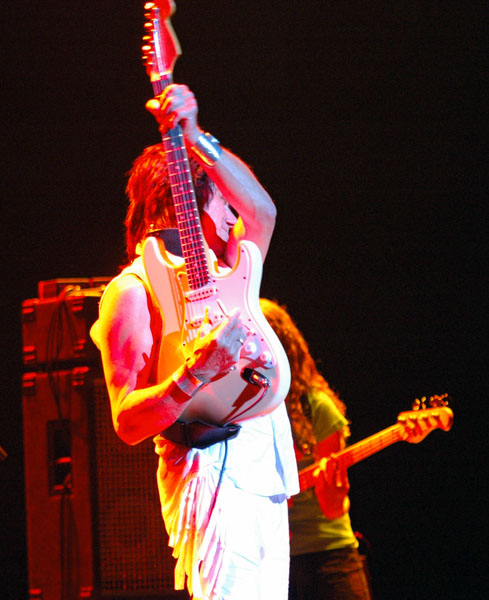 Wanting to make fusion music that was more accessible than Mahavishnu Orchestra, largely, as the self-effacing guitar icon said, because he couldn't play as well as his heroes like McLaughlin, Beck spoke about Indian sitar legend Ravi Shankar being a seminal influence, and listening to his playing—the bends and phrasing—it's easy to hear the connection. But Beck has also been influenced by disparate styles such as rockabilly, and it's the guitarist's rock-allegiance that results in his avoiding extended blowing, instead aiming for short but incredibly meaningful solos.
Wanting to make fusion music that was more accessible than Mahavishnu Orchestra, largely, as the self-effacing guitar icon said, because he couldn't play as well as his heroes like McLaughlin, Beck spoke about Indian sitar legend Ravi Shankar being a seminal influence, and listening to his playing—the bends and phrasing—it's easy to hear the connection. But Beck has also been influenced by disparate styles such as rockabilly, and it's the guitarist's rock-allegiance that results in his avoiding extended blowing, instead aiming for short but incredibly meaningful solos. The capacity audience of media people at the press announcement also found out that there's a new album in the works—though Beck wouldn't give out much: it won't feature his knockout touring band, though he hopes to continue working with them well into the future; it will be produced by another legend, Trevor Horn; it will be an eclectic mix of styles and sounds; and David Torn will not be involved, in spite of the rumor mill.
Beck also talked about his other passion, restoring vintage automobiles, and how he's learned to minimize some of the inherent risks after incidences including one where a car began to lower and almost—but, thankfully, not quite—came down on his head.
A slide show prepared by the festival, showing an image of Beck with a constant flow of two-word descriptions solicited from fans that ranged from "Guitar God" to the more clearly descriptive "F@%cking Amazing," lightened the mood even further, though Beck later said he was wondering who they were talking about when he saw all the quotes. Most telling is when he addressed the subject of taking risks in performance: "It's a form of musical Tourrette's, really...I try not to be boring, that's all it is really; I make terrible mistakes. But when there's a result there's a result and if it's a great mistake I put it in there [points to head] and then expand it."
Self-effacing he may be, but confidence has never been a problem with Beck, and his first of two sold-out performances at the 3,000+ seat Salle Wilfred Pelletier in Montreal's Place des Arts, not only made that clear, it proved the value of working with the same group for an extended period of time. Beck has been playing with young Australian bass phenom Tal Wilkenfeld, keyboardist Jason Rebello and powerhouse drummer Vinnie Colaiuta for over 18 months now, and as good as Performing This Week is, it's no preparation for the sheer energy of Beck on a large stage with rock lighting and attitude.
Culling material largely from Performing This Week but with enough changes to some of the arrangements and the inclusion of other material to keep even those familiar with the release on their toes, Beck arrived onstage in all-white, with a spotlight keeping him in focus throughout the 100-minute set. His musicians remained largely in the background, and Beck took the lion's share of the solos, but the strength of his group couldn't be ignored. Rebello, who has played in the jazz world with other British artists including Courtney Pine, Tim Garland and, in the pop world, mega-star Sting, may be the least known of the group but he provided not just the right accompaniment, but emulated some of Jan Hammer's well-known synth tones when necessary for tracks including the weighty "Led Boots," and high velocity "Space Boogie."
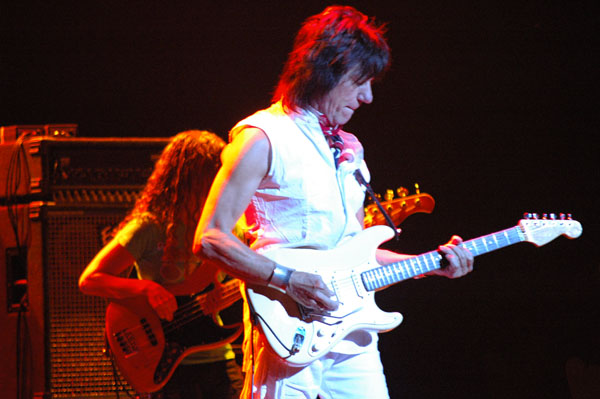
Colaiuta is a force of nature and has been for years, but in Beck's group he's found the perfect balance between his larger-than-life arena-style playing, the kind of visceral grooves Beck demands, and some outstanding solos, especially on Billy Cobham's "Stratus," where he channeled the Mahavishnu Orchestra drummer's virtuosity through his own inimitable style.
But, as was the case on Performing This Week, it was Wilkenfeld—who, still in her early 20s, is a clear bass legend in the making, both for her work with Beck and her own debut album, Tranformation (Self Produced, 2007)—whose star burned nearly as brightly as Beck's during the show. As expected, she delivered the goods on Beck's classic version of Stevie Wonder's "'Cause We've Ended as Lovers," but throughout the set she was the perfect combination of unshakable anchor and foil for Beck as she provided brief but perfect responses to Beck's equally flawless playing.
Beck's performance was a veritable guitar lesson on how to achieve remarkable breadth without the use of an array of effect pedals. He did have four amplifiers onstage—two Marshall stacks and two amps that looked to be Fenders; the perfect combination for his trademark Stratocaster. Beck switched between amps for tone throughout, but the real magic was in his hands and nowhere else. With no shortage of left hand virtuosity, it was his right hand that provided the real difference, whether it was the remarkably vocal use of his whammy bar, tapping (the jury is still out as to whether he was the first to use two-handed tapping, but he was certainly an early innovator) and other indescribably outrageous techniques that have made his sound so immediately recognizable that one note is more than enough. And yet, at the end of the day Beck may have given an exhilarating, rock-edged performance that left the crowd breathless at times, but he also proved a deeply lyrical player on tunes like The The Beatles' "A Day in the Life" and "Where Were You"—an impressive duet with Rebello where Beck's affinity for the music of Ravi Shankar couldn't have been clearer—the latter the first half of a two-song encore that also included a raucous, crowd-pleasing "Peter Gunn."
 Beck was having a terrific time, as was the audience—giving Beck and the group no less than six standing ovations throughout the set, one in particular during a spot where Wilkenfeld joined Beck front and center and the two played a duet together on her bass—Beck standing behind her and playing a groove on the two bottom strings while Wilkenfeld soloed on the top two. Beck's admiration for this young Australian bassist with a bright future was clear during the entire show, and she was as equally engaged with Beck, but also with her other bandmates, with plenty of smiles and laughter going on around the stage to make it an even more enjoyable experience for the audience.
Beck was having a terrific time, as was the audience—giving Beck and the group no less than six standing ovations throughout the set, one in particular during a spot where Wilkenfeld joined Beck front and center and the two played a duet together on her bass—Beck standing behind her and playing a groove on the two bottom strings while Wilkenfeld soloed on the top two. Beck's admiration for this young Australian bassist with a bright future was clear during the entire show, and she was as equally engaged with Beck, but also with her other bandmates, with plenty of smiles and laughter going on around the stage to make it an even more enjoyable experience for the audience. Experience is the best word to describe a Jeff Beck show. It's sometimes difficult to determine whether a show is that good or whether it's the buzz of being there, watching the dynamic performance of a well-planned set that, with no introductions and only brief breaks between some of the tunes, ran almost continuously for 90 minutes before the audience demanded an encore. But in the case of Beck, it was a show that far surpassed all expectations, as high as they were based on Performing This Week. If the group was this hot for the 6:00 PM show, it can only be imagined how hot the second show, later that evening, would be.
July 6: Anat Cohen Quartet
Slowing down the pace and energy—although there was no shortage of impassioned playing during her set—Israeli-born, New York-resident clarinetist Anat Cohen gave a standout performance at FIJM's new L'Astral venue, housed in the Maison du Festival Rio Tinto Alcan, its new headquarters located at the festival's ground zero. Whether playing with siblings Avishai (trumpet) and Yural (saxophone) as the 3 Cohens on One (Self Produced, 2005) or with her own group on albums including Place in Time (Anzic, 2005), the clarinetist has been gradually building a solid reputation as both an astute composer and captivating performer.
Featuring two young members of her group from Notes from the Village (Anzic, 2008)—guitarist Gilad Hekselmen and drummer Daniel Freedman—alongside bassist Joe Martin (Jane Monheit's musical arranger on the singer's In the Sun (N2K, 2002), Cohen's 75-minute set included two of her own tunes, one from Hekselman, and two covers arranged for maximum effect. Fats Waller's "Jitterbug Waltz" opened the set, providing plenty of solo space, but most impressively for Hekselman, a remarkable player who channels a lot of references into his own style, but most notably that of Mick Goodrick in his ability to create streaming arpeggios and broad intervallic leaps.

l:r: Gilad Hekselmen, Joe Martin, Anat Cohen, Daniel Freedman
Cohen is a fluid player who was also a commanding presence onstage, although her youthful exuberance was, at times, a little over the top. Still, her ability to create serpentine cascades of notes and vibrant flourishes made her exceptionally popular with the audience. While her "J Blues" was a fine blues that, again, gave her group plenty of room to maneuver but was nothing out of the ordinary compositionally, "The Purple Piece" was a far better demonstration of her writing skill. A ballad that, as it progressed, gradually assumed more weight and energy, it was a compelling piece that spotlighted both herself and Hekselman with two of the finest solos of the set.
Another highlight was her set closer, a bright choro that spotlighted Freedman, who was yet another outstanding drummer at a festival that seems to be overflowing with them. It was a fine set from an engaging player whose reputation continues to grow. Cohen proved an astute leader and recruiter of lesser-known talent deserving of greater exposure—especially Hekselman, whose second album, Words Unspoken (Smalls. 2009), has just been released and demonstrates considerable promise.
Visit Joshua Redman, Brian Blade, Kenny Werner, Jeff Beck, Anat Cohen and Festival International de Jazz de Montreal on the web.
Photo Credits
All Photos: John Kelman
Days 1-3 | Days 4-6 | Days 7-9
Tags
Comments
PREVIOUS / NEXT
Support All About Jazz
 All About Jazz has been a pillar of jazz since 1995, championing it as an art form and, more importantly, supporting the musicians who make it. Our enduring commitment has made "AAJ" one of the most culturally important websites of its kind, read by hundreds of thousands of fans, musicians and industry figures every month.
All About Jazz has been a pillar of jazz since 1995, championing it as an art form and, more importantly, supporting the musicians who make it. Our enduring commitment has made "AAJ" one of the most culturally important websites of its kind, read by hundreds of thousands of fans, musicians and industry figures every month.



